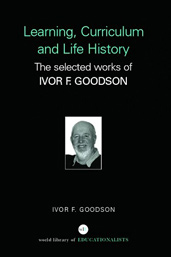Learning, Curriculum and Life Politics: the selected works of Ivor F. Goodson
Becoming a School Subject
Sociological and Historical Perspectives
Contemporary accounts of school subjects arise from two major perspectives - the sociological and the philosophical. Sociological accounts have followed a suggestion made in 1968 by Musgrove that researchers should:
examine subjects both within the school and the nation at large as social systems sustained by communication networks, material endowments and ideologies. Within a school and within a wider society subjects as communities of people, competing and collaborating with one another, defining and defending their boundaries, demanding allegiance from their members and conferring a sense of identity upon them... even innovation which appears to be essentially intellectual in character, can usefully be examined as the outcome of social interaction (p.101).(1)
Musgrove remarked that 'studies of subjects in these terms have scarcely begun at least at school level'.
A more recent influential work in the field of the sociology of knowledge was the collection of papers in Knowledge and Control edited by M.F.D. Young in 1971. The papers reflect Bernstein's contention that 'how a society selects, classifies, distributes, transmits and evaluates the educational knowledge it considers to be public, reflects both the distribution of power and the principles of social control'. Young likewise suggests that 'consideration of the assumptions underlying the selection and organization of knowledge by those in positions of power may be a fruitful perspective for raising sociological questions about curricula'. The emphasis leads to general statements of the following kind:
Academic curricula in this country involve assumptions that some kinds and areas of knowledge are much more 'worthwhile' than others: that as soon as possible all knowledge should become specialized and with minimum explicit emphasis on the relations between the subjects specialized in and between specialist teachers involved. It may be useful therefore, to view curricular changes as involving changing definitions of knowledge along one or more of the dimensions towards a less or more stratified, specialized and open organization of knowledge. Further, that as we assume some patterns of social relations associated with any curriculum, these changes will be resisted insofar as they are perceived to undermine the values, relative power and privileges of the dominant groups involved.
- Bernstein, B. (1971) 'On the classification and framing of educational knowledge', in M.F.D.
- Young (Ed) Knowledge and Control, London: Collier-Macmillan.
- Young, M.F.D. (1971) 'An approach to the study of curricula as socially organised knowledge', in M.F.D. Young (Ed) Education and Control: New Directions for the Sociology of Education, London: Collier Macmillan, p. 31.
- ibid, p. 34.
